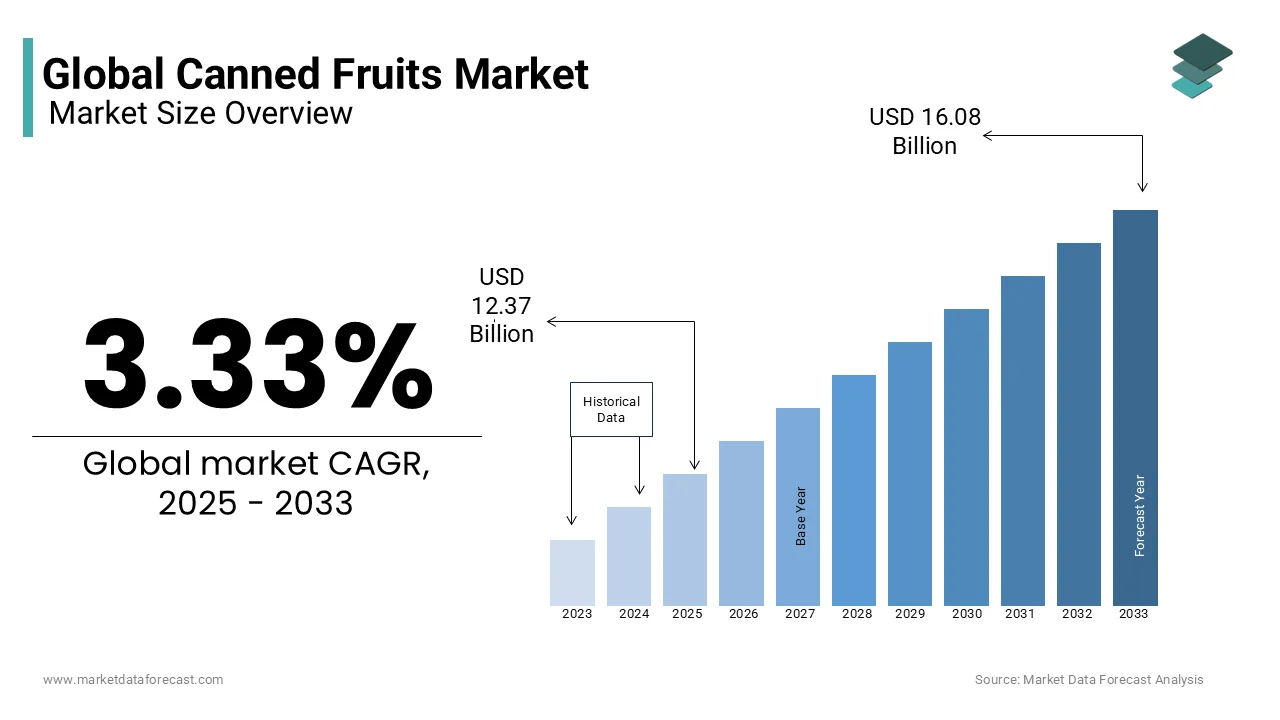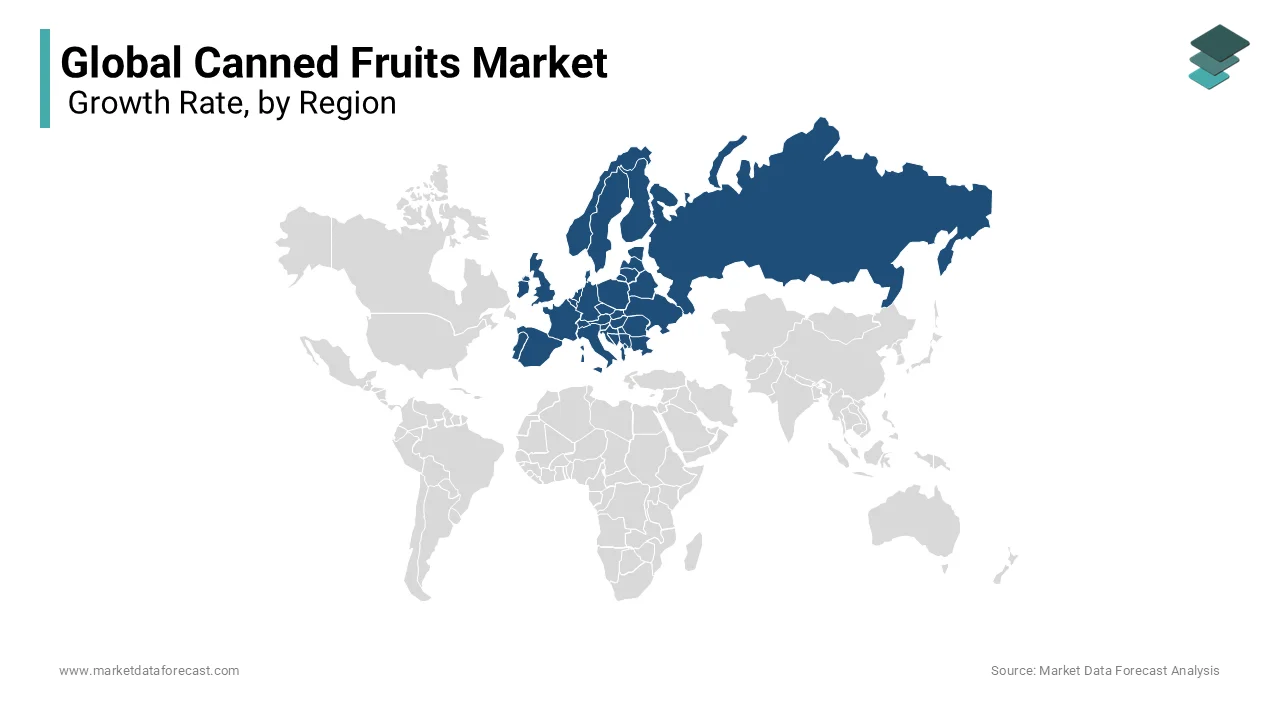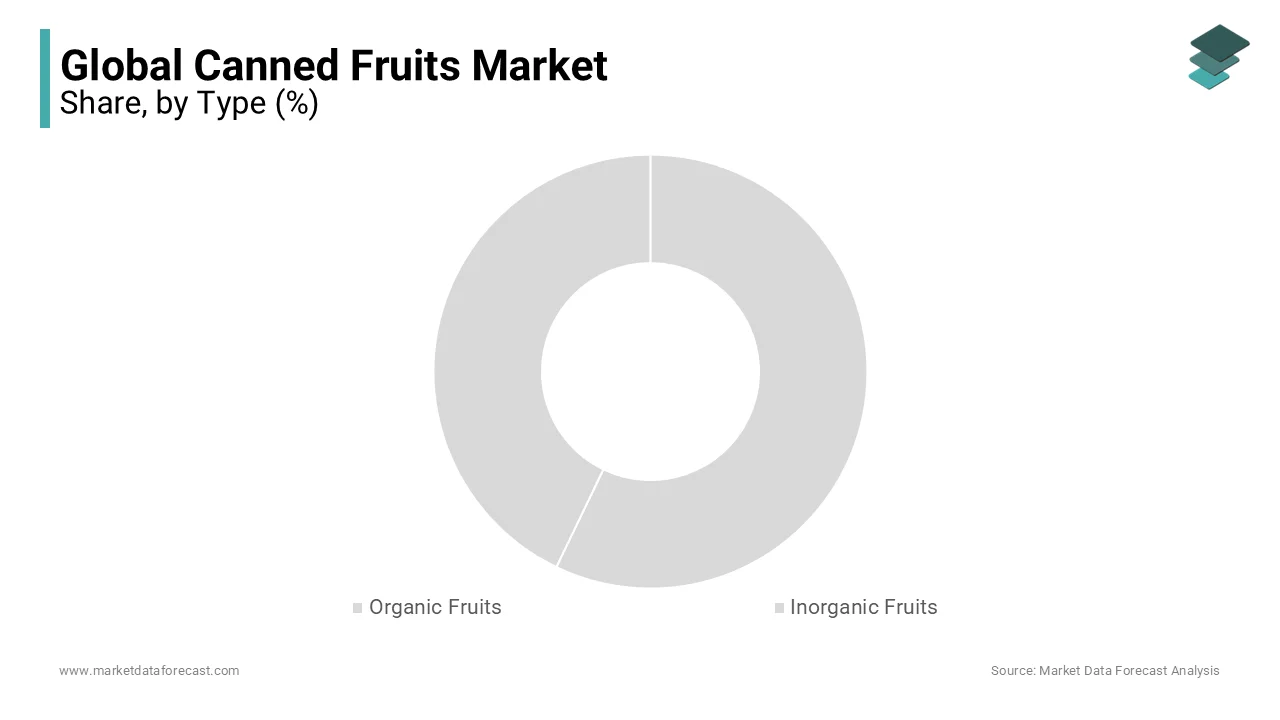Global Canned Fruits Market Size, Share, Trends & Growth Forecast Report - Segmented By Type (Organic and Inorganic), Form, Distribution Channel, And Region (North America, Europe, APAC, Latin America, Middle East And Africa) - Industry Analysis 2025 to 2033
Global Canned Fruits Market Size
The Global Canned Fruits Market size was valued at USD 11.97 billion in 2024, and the market size is estimated to be USD 12.37 billion in the year 2025, and this value is expected to reach USD 16.08 billion by the year 2033, growing at a CAGR of 3.33% between 2025 and 2033.

MARKET OVERVIEW
Canning of food products is a preservation technique using a combination of heating and storing procedures in airtight containers to extend the shelf life of the foods significantly by killing all the microorganisms responsible for the food spoilage. Virtually any type of food product that is harvested or processed can be canned. This procedure has played an important role in provisioning armed forces of any nation with sufficient ration and has also been key in making available some varieties of food product which can be harvested only in a particular region or geography to new regional markets.
Although the consumer today has many options and can find fresh food for comparatively longer durations owing to technological advancements and freezing options, there was a time when some food varieties were only available in canned form. Even now owing to all these advancements canned food remains a crucial part of any pantry across the world.
Canning is a food preservation method that involves uses of heating and storing procedures in airtight containers, which increases the shelf life of food products by the elimination of microorganisms that cause the food spoilage. The addition of preservatives further prolongs the shelf life and keeps food fresh for a longer time.
Factors fuelling the growth of the market are a rapid rate of urbanization, an increasing number of nuclear households, busy lifestyles and increasing demand for portable storage methods for food products as well as growing popularity for convenience foods. However, factors like the presence of alternative economic packaging methods and high prices of canned fruits are the factors hindering the growth of the market.
Owing to busy lifestyles, consumer inclination toward consumption of processed and ready to eat food products has increased during the recent times, and also due to the retention of a high amount of nutrients and flavor canned food has become one of the preferred choices of preserved food among consumers, Also increase in the percentage of working women has increased the dependency of consumers on packed foods which in turn has led to the growth in demand for food with longer shelf life, which ultimately fuels the growth of Canned Food Market.
MARKET DRIVERS
The steadily changing food habits of the global population have contributed significantly to increasing the global consumption of canned fruits in the past few years. Factors such as the rapid rate of urbanization, high disposable incomes, and busy lifestyles are the major drivers in the growth of the global Canned Fruits Market. The mentioned trends have made canned fruits an integral part of the pantries of people across the world. In addition to this, the easy availability of canned fruits and awareness that canned fruits can deliver better nutritional value, and their economic prices as compared to fresh fruits are improving the demand for Canned Fruit Market. Canned fruits can be shipped to different regions where some of them cannot be grown owing to the environmental conditions, in such areas consumers thus have the option of trying a wide assortment of fruits which would not be possible without the canned fruit market, this also led to an exceptional rise of the global canned fruits market.
MARKET DRIVERS
The steady rise in the demand for fresh and minimally processed produce is expected to have a huge negative impact on the market of canned fruits. Moreover, the increase in consuming outside food and reduction in home cooking practice is also expected to gradually erode the market.
REPORT COVERAGE
|
REPORT METRIC |
DETAILS |
|
Market Size Available |
2024 to 2033 |
|
Base Year |
2024 |
|
Forecast Period |
2025 to 2033 |
|
CAGR |
3.33% |
|
Segments Covered |
By Type, Distribution Channel, And Region |
|
Various Analyses Covered |
Global, Regional and Country Level Analysis; Segment-Level Analysis; DROC; PESTLE Analysis; Porter’s Five Forces Analysis; Competitive Landscape; Analyst Overview of Investment Opportunities |
|
Regions Covered |
North America, Europe, APAC, Latin America, Middle East & Africa |
|
Market Leaders Profiled |
Del Monte, ConAgra Foods, Dole Food Company, The Kraft Heinz Company, Seneca Foods, CHB Group, Rhodes Food Group, Conserve, Tropical Food Industries, Kangfa Foods, H.J Heinz, Ardo, and others. |
SEGMENTAL ANALYSIS
By Type Insights
By Distribution Channel Insights
By Type, the canned fruit market is mainly divided into two types namely Organics and Inorganics. Organics are the canned fruits produced without using synthetics like pesticides and chemical fertilizers, whereas Inorganics are produced by using these synthetics to protect the crop from some pests and other insects capable of causing some harm to the crop. However the organic segment is expected to grow at a considerable rate, owing to the increase in the inclination of consumers towards organic products due to the ill effects of synthetic chemicals on health, consumers have become more conscious about the food they consume.
REGIONAL ANALYSIS
Europe holds the dominant share of nearly 40% in the global canned fruit market worldwide followed by North America in second place. Collectively, the markets for canned fruits in Europe and North America have a stronghold on the development of the global Canned fruit market and they are estimated to remain at the helm of Canned fruit market development in the future. These regional markets are growing mainly due to factors such as busy lifestyles, high preference for convenience foods and, high disposable incomes. However, these regions are expected to observe stagnant growth in the future because of an increase in demand for fresh and organic fruits. On the other hand, the Canned fruit market in the region of Asia-pacific is growing steadily owing to the increase in urbanization of some countries in this region.

Food safety always remains a top priority for every food processing or manufacturing company. Abiding with this, the leading players in this market promise to provide consumers with the safest, freshest, and high- quality fruit. The introduction of highly advanced machines, including new optical color and laser sorts, high-speed packaging lines, and On-site freezing storage has made it convenient to process canned fruit in a better manner.
KEY MARKET PLAYERS
The key players in the market are Del Monte, ConAgra Foods, Dole Food Company, The Kraft Heinz Company, Seneca Foods, CHB Group, Rhodes Food Group, Conserve, Tropical Food Industries, Kangfa Foods, H.J Heinz, Ardo, and others.
RECENT HAPPENINGS IN THE MARKET
During March of 2023, Del Monte which is one of the largest producers, distributors, and marketers of premium quality and branded food products, announced their plans for conversion to non-BPA packaging and an incline in their non-GMO offerings.
MARKET SEGMENTATION
This research report on the global Canned Fruits Market has been segmented and sub-segmented based on Type, Distribution channel, & region.
By Type
- Organic Fruits
- Inorganic Fruits
By Distribution Channel
- Supermarkets/Hypermarkets
- Convenience Stores
- Specialist Retailers
- Online Retails
- Others
By Region
- North America
- Europe
- Asia Pacific
- Latin America
- Middle East and Africa
Frequently Asked Questions
1.What is canned fruit?
Canned fruit refers to fruits that have been processed, usually by heating and sealing them in airtight containers, such as cans or jars, to preserve their freshness and flavor for extended periods.
2.How is canned fruit made?
Canned fruit is typically made by cleaning, peeling, slicing, or dicing the fruit before it's cooked briefly (blanched) to preserve its color and texture. Then, it's packed into cans or jars along with syrup or juice, sealed, and heated to kill any bacteria, ensuring its preservation.
3.What types of canned fruit are available?
The canned fruit market offers a wide variety of options, including peaches, pears, pineapples, mandarin oranges, mixed fruit cocktail, cherries, apricots, and more. These fruits can be packed in their own juices, light syrup, heavy syrup, or even artificial sweeteners for low-calorie options.
Related Reports
Access the study in MULTIPLE FORMATS
Purchase options starting from $ 2500
Didn’t find what you’re looking for?
TALK TO OUR ANALYST TEAM
Need something within your budget?
NO WORRIES! WE GOT YOU COVERED!
Call us on: +1 888 702 9696 (U.S Toll Free)
Write to us: [email protected]
